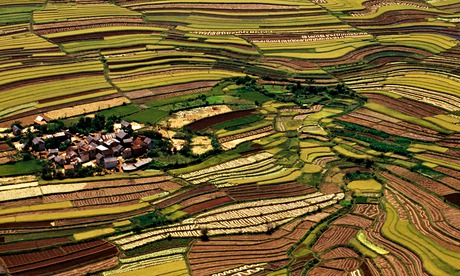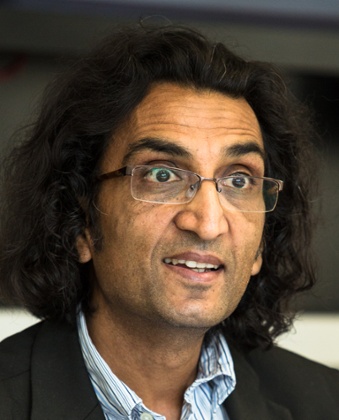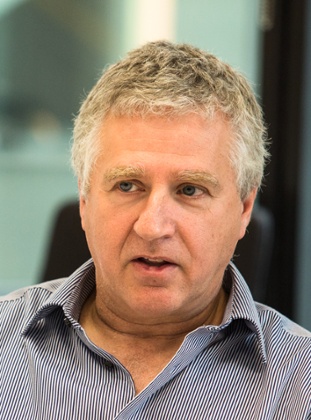Food shortages are everyone’s responsibility
Can we trust retailers to provide us with healthier, more sustainable diets or do we need verification at grassroots level?
Sponsored feature
Sponsored feature

The UN Food and Agriculture Organisation (FAO) predicted five years ago that we will need to produce 70% more food by 2050, and called for enhanced investment in sustainable agricultural production.
That pronouncement sparked much debate about the need to build a more sustainable food system. But what do we mean by sustainability? What are the roles of industry, government and consumers? And what are the tools and models we will need?
These were some of the questions addressed at a recent roundtable event, hosted by the Guardian in association with Bord Bia, the Irish Food Board, and attended by representatives from academia, civil society and private sector organisations.
What is sustainability?
The roundtable grappled first with the concept of sustainability itself, and how we break it down into something more manageable. For Keith Kenny, head of sustainability at McDonalds, it’s defined by what he called the “three Es”: ethics, environment and economic viability.
“If we’d had this debate five years ago, there would have been different opinions, but there’s more alignment now,” he said. “It’s always going to be a balance of those three.”
Within that, there’s a further “basket of issues”, according to Hugh Jones, director of the Carbon Trust. “There’s a need for better policy and healthier lifestyles at the consumer end,” he said. “Food waste is a big problem, and you need to factor in water and climate change too.”
Mark Pettigrew, agricultural sustainability manager for Europe at PepsiCo, echoed this sentiment, calling for a systemic approach to the concept. “It’s important to take a whole value-chain approach, from production through to consumption,” he said. “There are real challenges of poverty, obesity and inequity across the food system, and tackling it requires collaboration across the value chain.”
In 2012, Bord Bia announced a plan to get every Irish farmer and food and drink manufacturer signed up to the sustainability agenda. The voluntary “Origin Green” programme requires farmers to undertake regular sustainability assessments, while manufacturers develop multi-annual plans with clear targets in areas such as sourcing, emissions, energy, waste, water and biodiversity, and social sustainability.
“Ireland prides itself on being green,” said Aidan Cotter, chief executive of Bord Bia. “There’s a huge world opening up around sustainability, and it’s no longer good enough to just talk about it. We have to prove we can do it. So we’ve set ourselves the goal that, by 2016, every farming and food manufacturing business will be signed up to this.”
Supply chain risk
For many multinational corporations and large retailers, the sustainability of supply chains has already become an essential part of risk management, as their own long-term future depends on the viability of those who provide their inputs. Earlier this year, for example, the supermarket chain Asda revealed that 95% of its entire fresh produce range is already at risk from climate change. In 2012, confectionery giant Mondelez International launched a $400m Cocoa Life sustainability programme to support its cocoa-producing communities.

“For us it is about the idea of creating shared value, which has brought a new lens for looking at things,” said Inder Poonaji, head of sustainability at Nestlé. “It used to be just economics but now, with more responsible sourcing guidelines, we’re looking at how we sustain the communities around these farms in future – because we know that if we don’t, they’re not going to exist.”
One of the barriers to sustainability in global value chains is the sheer scale of them, and the difficulty of measuring and standardising within such a broad concept. Nestlé uses a tool called Rise (Response-Inducing Sustainability Evaluation), developed by the University of Bern to assess the sustainability of agricultural production at the level of the individual farm, with data analysed against 10 sustainability indicators, including soil use, animal husbandry, nutrient flows and biodiversity.
More widespread access to basic technology is also proving useful in developing countries, said John Steel, chief executive of Cafedirect. “We’ve recently launched a technology platform called WeFarm, an SMS-based peer-to-peer learning network for farmers. It means that if farmers see frost on a plant in Kenya, they can post a question through their phone and get an answer about what to do. We’re trying to remove the barriers that the chain puts in the way, and make it more collaborative at grassroots level.”
A multitude of certification schemes have also emerged over the years, aimed at making value chains more equitable, for producers in developing countries in particular. However, many at the roundtable suggested certification in the food and drink sector has become unwieldy – the Ecolabel Index currently lists 148 labels for the food sector alone.
“I see it as industry-filtered, with some civil society filtering too, but you’ve basically got a patchwork quilt with lots of initiatives and gaps. This is where state agency becomes really important,” said David Barling, reader in food policy at City University, London.
Abdicating responsibility
Although some consumers feel confident interpreting the various kitemarks, most would prefer to outsource responsibility for sustainable choices to the retailers who still sell us the majority of our food, said Cotter. “Consumers expect food on the shelves to be produced sustainably.”

Tim Hess, reader in water management at Cranfield University, agreed that supermarkets have come to play a pivotal role as gatekeepers to sustainability. “Most consumers are making choices through where they buy from, thinking that if they shop from a particular place they will do the right thing, and if they go to another place it will be cheap,” he said.
But while some retailers compete on sustainable credentials, there was a consensus at the roundtable that achieving a step-change in sustainable food depends on greater pre-competitive collaboration.
The Waste & Resources Action Programme (WRAP) was held up as one good example, having initiated the Courtauld Commitment under which food and drink businesses including Tesco, Sainsbury’s, Unilever and Nestlé have committed to work together to reduce food, packaging and supply-chain waste.
The drive towards sustainability is often channelled through specific routes – labelling, diets, retailer commitments, or global commodity roundtables, such as that for beef, but there are other methods too, said Mark Driscoll, head of food at Forum for the Future, who described some early-stage work his organisation has been doing with the UN Global Compact.
“This is about moving beyond the farm-by-farm approach, and looking at more regional or country-based approaches, linking businesses, communities and civil society organisations. How can we provide the tools and techniques for local decision makers to really make sustainable agriculture mainstream? It’s a challenge, and we’ll need to think slightly more out of the box.”
Perhaps the greatest challenge is still achieving the third “E”: economic viability. As Justin McCarthy, editor of the Irish Farmers Journal pointed out, farmers are in the worst position. “They’re in the middle. Their inputs – such as fertilisers - are controlled by three or four large companies, and then there’s a concentrated network of processors and retailers at the other end that sets the price. It puts a huge squeeze on their profitability.”
In the end, as McCarthy pointed out, retailers respond to what consumers (and shareholders) want. Low prices is one thing they certainly want and, according to Melissa Barrett, director of sustainability services at Accenture, grasping their social, ethical and environmental values will be an even bigger challenge in years to come.
“We’ve done research on what we call tomorrow’s consumers, and the movement of information with younger generations is so fast, and no longer just about identifying with a sustainability label,” she said. “It’s about what links into my values at the time, and what my peers are communicating about.”
A more sustainable food industry is certainly achievable, but as McDonald’s’ Kenny pointed out, sustainability is a moving target. “We know what best practice is now, but we’ll know more next year. It’s not a destination – it’s a journey, and we have to keep moving.”
Key points
• FAO estimates of greenhouse gas data released earlier this year showed that emissions from agriculture, forestry and fisheries have nearly doubled over the past 50 years and may increase by another 30% by 2050, unless greater action is taken.
• A 2013 report by the UK’s Institution of Mechanical Engineers – Global Food; Waste Not, Want Not – found that 30%-50% of food produced around the world is wasted.
No comments:
Post a Comment